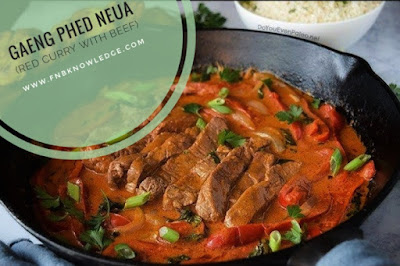Gaeng Phed Neua (Red Curry With Beef)
Servings: 4 people
Prep time: 10 minutes
Cook time: 15 minutes
Total time: 25 minutes
Serving size: 1 portion
Per serving
Calories: 433.7
Fat: 39.2 g
- saturated 27.2 g
- unsaturated 7.8 g
Sugars: 2.9 g
Fiber: 0.9 g
Protein: 13.9 g
Cholesterol: 46.9 mg
Intro
Intro
Thai Translation – Kaeng = Curry, Phed = Spicy, Neua = Beef
Red curry is a mild curry and named red purely because of the colour of the paste. It is a fragrant and creamy-curry, hearty and tempting. It is best served with sticky-rice or fluffy white-rice . You can buy pre made curry pastes in most supermarkets which are excellent . But they're no substitute for a freshly made paste of your own which will be whipped up in minutes.
Lean beef is a superb source of protein and other minerals. It is delicious during a curry and when cooked well, it's a delicate mineral taste that goes superbly with a hearty creamy flavours within the curry. The eggplants Which use in this curry are Thai eggplants that are small and round and sometimes described as bitter. There are three main varieties you'll use for this recipe –egg size and shaped eggplants (makhue prot), the pea sized eggplant (makhue puang) which are crunchy and bitter in taste or the purple eggplants or aubergine. Look for the Thai eggplants in Asian supermarkets, but you'll use aubergine for this recipe – just take care about overcooking the eggplant because it can turn to mush.
Ingredients
- 500ml coconut milk
- 250g of lean beef in strips
- 2 tbsp of red curry paste
- 1 kaffir lime leaf
- 1 tbsp Thai basil leaf
- 1 tsp palm sugar (or brown sugar)
- 3 to 5 thai-eggplants (or 1 small young purple-eggplant)
- 1 tsp fish sauce
Preparation
- Slice the meat(beef) into cubes or thin slices that depends on your own preference. Chop the thai-eggplants in one-fourth {1/4}or the purple-eggplant into inch-sized pieces. To stop the eggplant from going brown, place In bowl and cover with water once cut. Remove the stem from the kaffir-lime leaf and cut into pieces.
- In a saucepan or wok simmer 2 tablespoons coconut milk. When the Vegetable oil(coconut oil) separates from the coconut milk, add the curry paste stirring well.
- Cook the curry-paste for 1 to 2 minutes or until it begins to be fragrant.
- Add the meat(beef) to the curry paste and cook for an additional 1-2 minutes in order that the meat is starting to change colour.
- Add the rest of coconut-milk and bring to the boil.
- Add the eggplants, kaffir lime leaf, fish sauce and sugar, stirring well to mix .
- Reduce the warmth to a low simmer and cook for about 10 minutes over low to medium heat.
- Add basil leaves and turn heat off. Serve with steamed rice.
Cooking Tips
- Substitute chicken, pork or tofu for beef for an alternative option.
- You can also use other vegetables in the dish like thinly sliced carrot, chopped beans, zucchini or potato. Amend cooking times accordingly for different vegetables, ensuring some do not get overcooked while others undercooked.
- Coconut milk is often thought to be the juice inside a coconut but it is actually extracted from the white coconut flesh. You can make your own coconut milk at home by getting a fresh coconut, scrape out the flesh and shred in a blender. Add water and squeeze the milk out of the shredded coconut. For those less adventurous, coconut milk can be bought in supermarkets in cans or even powdered form.
- Remember not to make the mistake of substituting coconut cream for coconut milk. Coconut cream is thicker, sweeter and heavier than coconut milk and is generally used for sweets and desserts.
- If you do not like the taste (or the fat content) of coconut milk, you can purchase low-fat coconut milk which is suitable for this recipe. You can also make a substitute with evaporated milk which will not have the same creamy flavour but it is ok to use. Simply mix ¼ cup evaporated milk with ¾ cup of water and use the same way.
Nutritional Information:
Servings Per Recipe: 4
Amount Per Serving:
| Calories | 433.7 |
| Total Fat | 39.2 g |
| Saturated Fat | 27.2 g |
| Polyunsaturated Fat | 1.1 g |
| Monounsaturated Fat | 6.7 g |
| Cholesterol | 46.9 mg |
| Sodium | 552.5 mg |
| Potassium | 422.8 mg |
| Total Carbohydrate | 8.6 g |
| Dietary Fiber | 0.9 g |
| Sugars | 2.9 g |
| Protein | 13.9 g |
| Vitamin A | 0.7 % |
| Vitamin B-12 | 24.4 % |
| Vitamin B-6 | 9.7 % |
| Vitamin C | 2.1 % |
| Vitamin D | 0.0 % |
| Vitamin E | 0.6 % |
| Calcium | 2.8 % |
| Copper | 15.2 % |
| Folate | 5.4 % |
| Iron | 30.2 % |
| Magnesium | 16.7 % |
| Manganese | 44.7 % |
| Niacin | 17.4 % |
| Pantothenic Acid | 4.9 % |
| Phosphorus | 19.3 % |
| Riboflavin | 7.3 % |
| Selenium | 14.2 % |
| Thiamin | 4.3 % |
| Zinc | 20.3 % |
The % represents the percentage of of your daily recommended intake. This number is approximated, based on an average 2,000 calorie diet. You should interpret according to your daily dietary intake of calories.


0 Comments